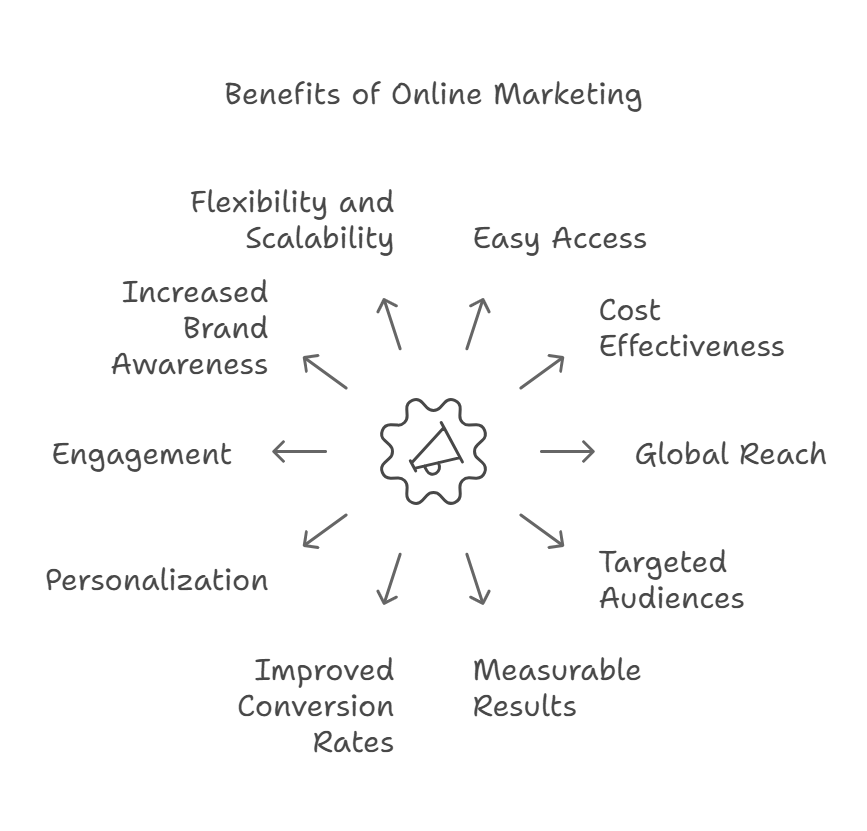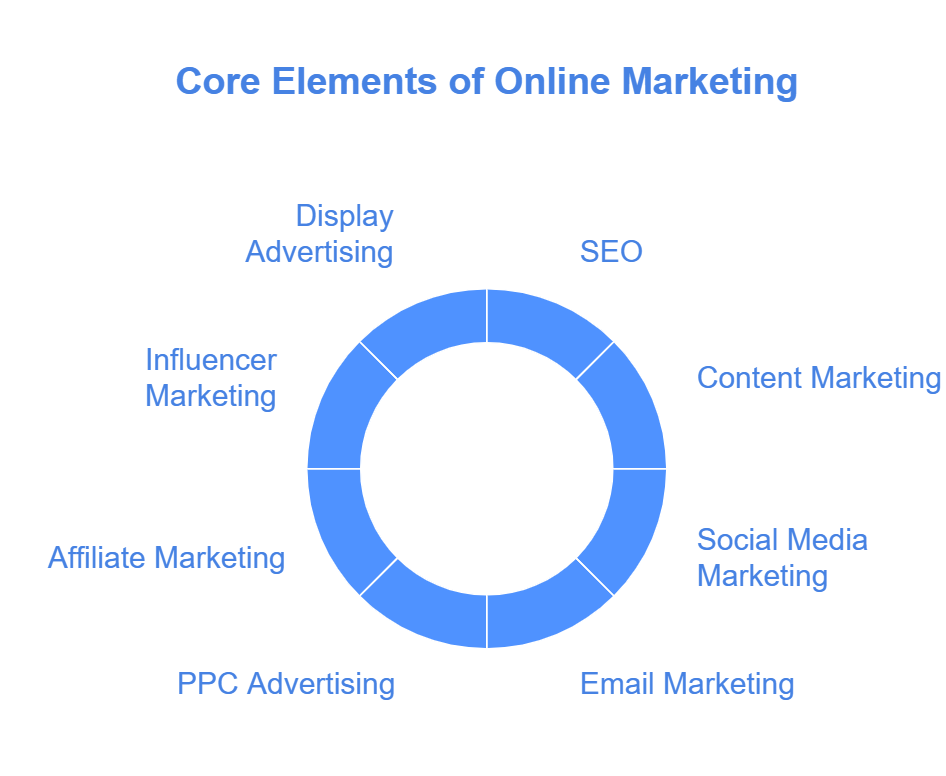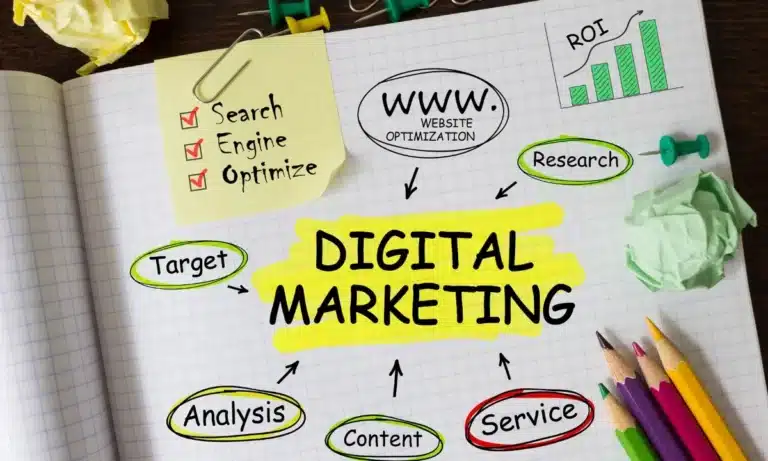In the present online marketing is extremely crucial for businesses who wish to grow and prosper. If you’re new to the concept, you may be asking, “What exactly is online marketing, and how can it help me?” This guide for beginners will outline the basics of online-based marketing, explain the key concepts, and offer simple ways to start.
The Basics of Online Marketing:
“Online marketing,” also known as digital marketing, makes use of the Internet to advertise goods and services. In contrast to traditional marketing that employs media such as television, newspapers, or radio, internet marketing connects people to products and services through digital channels. The purpose is to draw in visitors to get leads and boost sales through various strategies for online marketing.
Why is Online marketing important?
Nowadays, everything is touched by the Internet, and day by day, the number of internet users increases rapidly. People of all ages use the Internet to learn something, buy things, and grow their businesses.
“People build their businesses not only to reach hundreds or thousands of people, but with the help of digital marketing, they reach billions of people and make more profit than with traditional businesses.”
Benefits of Online Marketing:

Online Marketing is effective because it offers:
Easy Access: The Internet lets you connect with your customers anytime. It helps maintain engagement with potential buyers.
Cost Effectiveness: In digital marketing, you can run targeted campaigns for your business within any budget. That’s why it’s more effective than traditional marketing.
Global Reach: Even a small business can use digital marketing to reach customers worldwide. It breaks geographical boundaries and helps build a profitable business.
Targeted Audiences: Digital marketing lets you focus your marketing efforts on customers by demographics, their behavior locations, age, and location.
Measurable Results: You can track and measure your results using different tools.
Higher Conversion Rates: By monitoring and analyzing the outcomes, you can focus on people who already are interested in your service or product rapidly increasing the conversion rate of your customers.
Personalization: Digital marketing is more effective for personalized marketing. You can create meaningful customer interactions and send customized messages or emails about your products or services by tracking customers’ browsing or purchasing behavior.
Engagement: Digital platforms enable two-way communication by allowing direct interactions with customers and fostering stronger relationships with them through ongoing brand engagement.
Increased Brand Awareness: You can quickly increase brand awareness through social media, blogs, and ads.
Flexibility and Scalability: Whether your business is small or large, a digital marketing campaign allows you to grow and expand your business
Some Core Elements of Online Marketing:

SEO (Search Engine Optimization):
SEO (Search Engine Optimization) can help your website appear more prominently on search engine results. If you improve your website’s performance to be indexed by search engines like Google and Yahoo, you will get more traffic for free. It is essential for all websites.
The higher your website’s rank in search results, the more people will be able to see it, which implies more potential customers. To accomplish this, you need to concentrate on things such as increasing the number of page titles as well as speeding up your site and getting hyperlinks from other sites.
Content Marketing:
Content marketing is about creating valuable and relevant content that will entice and entertain your readers. It could include blogs, videos informational graphics, etc.
Content that is well-written helps build trust with your target audience and proves that your company is well-informed. Content marketing that is successful matches the needs of your audience and what it requires, guiding them on their way as consumers.
Social Media Marketing:
Marketing on social media is the use of platforms such as Facebook, Instagram, and LinkedIn to interact with your followers to share content that is valuable, and increase visitors to your site.
It allows you to interact directly with your clients and create brand recognition and a community around your business. It’s also a fantastic way to make targeted advertisements, which allows you to reach specific segments of the population through their preferences, interests as well as demographics.
Email Marketing:
The process of marketing via email is the sending of announcements or newsletters to clients who have subscribed. It’s a simple method of communicating with your target audience and keeping them updated about your services or products.
Email marketing can help maintain relationships with current customers to nurture leads and boost conversions. Strategies like automation and personalization can dramatically increase the efficacy of your marketing campaigns.
PPC (Pay-Per-Click) Advertising:
Advertising using PPC (Pay-Per-Click) advertising allows advertisers to display advertisements on search engines as well as social media. Pay only per click to your ad. The most used platforms to do this are Google Ads or Facebook Ads.
PPC is an effective way to instantly gain visibility and drive specific traffic to your site. It’s a great approach to connect with prospective customers who are seeking out products or services similar to yours. Affiliate Marketing
Affiliate marketing is the practice of working with companies or individuals (affiliates) who market your product for a fee. They utilize their channels, including websites or even social media, to generate leads or sales for your company.
Influencer Marketing:
Influencer marketing is focused on those who have a large following on social media or blogs to promote your products. Their endorsements generally have more credibility with their intended customers since they offer social evidence.
Display Advertising:
This is the process of the placement of videos, banner ads or other content that is visual on sites or applications. Display advertisements can be targeted based on user behavior, preferences, and demographics so that you can ensure your advert is seen by the correct people.
Video Marketing:
Making use of videos to promote your offerings is a fantastic method to boost the efficiency the product. With YouTube, TikTok, or embedded videos on your website Videos can aid in explaining complex concepts, demonstrating your product or even telling a story about your company by way of a captivating presentation.
Native Advertising:
Native advertising refers to advertisements which blend with the content on the platform and make them appear more natural and less annoying. Examples include sponsored articles and ads that fit the website’s contents.
Essential Things to Consider When Building Your Online Marketing Strategy

Creating an online marketing strategy isn’t just about posting content or running ads—it’s about having a clear roadmap to reach the right audience and achieve your business goals. Without a sound plan, you could end up wasting time and money on things that do not yield tangible results. To develop an effective strategy, Here are some key things to consider:
Understand Your Target Audience
Before you begin promoting something you must be aware of the exact demographics of your target audience. Think about their age, interests, online behavior, and pain points. Where do they spend most of their time online? What kind of content do they enjoy? The more you understand them, the easier it will be to create messages that connect with them.
Set Clear and Realistic Goals
Without clear goals, it’s hard to measure success. What do you want to achieve with your online marketing? More website traffic? Higher engagement on social media? More sales or leads? Define your goals using the SMART method—make them Specific, Measurable, Achievable, Relevant, and Time-bound. For example, instead of saying, “I want more website visitors,” set a goal like, “I want to increase website traffic by 30% in the next three months.”
Choose the Right Marketing Channels
Not all platforms are suitable for every business. Your audience might love watching videos on YouTube or scrolling through Instagram, while others prefer LinkedIn for professional content. Instead of trying to be everywhere, focus on the platforms that give you the best results. Research where your competitors and target audience are most active, and put your energy into those channels.
Create High-Quality and Valuable Content
Content is the heart of online marketing. Whether you’re writing blog posts, recording videos, or sharing social media updates, your content should provide value to your audience. Avoid being overly promotional—focus on educating, entertaining, or solving a problem. The more helpful your content is, the more people will trust your brand and engage with you.
Optimize for SEO and Visibility
If people can’t find you online, your marketing efforts won’t be as effective. Search Engine Optimization (SEO) helps your website and content appear in search results when people look for related topics. Research relevant keywords, optimize your website’s structure, and create content that answers common questions in your industry. This will help you get organic traffic, and not relying solely on advertisements that you pay for.
Engage and Build Relationships with Your Audience
Marketing online isn’t only about posting content. It’s about establishing relationships. Engage your customers through responding to comments, messages and inquiries. Ask for feedback, create polls, and encourage discussions. The more you connect with your followers, the more loyal they will become to your brand.
Track Your Performance and Improve
A great marketing strategy is constantly evolving. Use tools like Google Analytics, social media insights, and email marketing reports to see what’s working and what’s not. Be aware of the posts that have the most engagement, what advertisements generate the most sales, and the source of your traffic. Make use of this information to change the method you use and improve your performance as time goes on.
Conclusion & Reflections:
The first steps to begin online marketing may be challenging however, having a clear strategy and the right tools can make your business grow. Be sure to identify your customers and setting specific goals, deciding on the most effective channels and continuously developing strategies to improve. Consistency with data when making decisions and being flexible to change is vital to achieve the success of your business.







